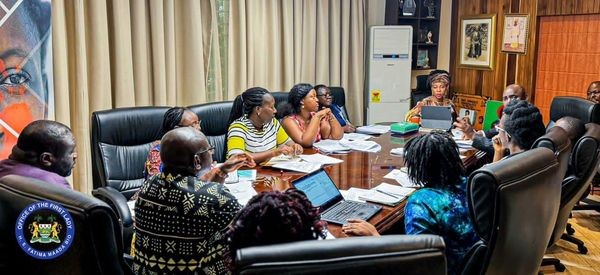In a significant step towards ending Child Marriage in Sierra Leone, First Lady Dr. Fatima Maada Bio has convened a meeting of the Technical Committee towards the proposed Prohibition of Early Child Marriage Bill at her Goderich office in Freetown. The meeting examined and refined the Bill.
Early marriage remains a pressing issue in Sierra Leone, with many girls forced into wedlock before the age of 18. This practice not only violates their human rights but also jeopardizes their health and educational prospects.
Her Excellency’s leadership in this Technical Committee meeting signifies the government’s commitment to tackling this critical social issue. The involvement of diverse stakeholders underscores a collaborative effort between the government and civil society to implement effective legal measures and safeguard the well-being of young girls in Sierra Leone.
The meeting paves the way for a stronger legislative framework to protect girls from the detrimental consequences of early marriage.
The UNFPA-UNICEF Global Programme to End Child Marriage reports that: “Sierra Leone is home to 800,000 child brides. Of these girls, 400,000 were married before age 15. The practice of child marriage has become slightly less common in the country over the past 25 years, with 30 per cent of all girls being married in childhood today compared with 37 per cent 25 years ago. If this rate of progress continues, still 27 per cent of all girls in Sierra Leone will marry before they turn 18 in 2030 – the target year for the elimination of the practice as set out in the Sustainable Development Goals (SDGs)”.
Globally, over the past decade, the proportion of young women who were married as children decreased by 15 per cent, from nearly 1 in 4 to 1 in 5 girls becoming child brides.
This means that, over the last 10 years, the marriages of some 25 million girls have been averted. But the global rate of progress also needs to be accelerated to enable the elimination of child marriage by 2030.
In Sierra Leone specifically, even if the rate of progress witnessed over the past decade is doubled, 13 per cent of all girls will be child brides in 2030 and in 2050, the child marriage prevalence in the country will still be 4 per cent.
Girls in Sierra Leone are not only at risk of child marriage. Among women aged 18–49, just 1.3 per cent are ‘only’ child brides, while 33.7 per cent of all women in this age group have been subjected to both child marriage and female genital mutilation (FGM).
A further 56.8 per cent of the women have undergone FGM but not child marriage, meaning that among women in this age group, only 8.3 per cent have not been subjected to either of these harmful practices.
Despite progress in ending child marriage over the last decade, this achievement is now under threat due to the COVID-19 pandemic. Over the next decade, UNICEF estimates that up to 10 million additional girls will become child brides globally.
Notwithstanding these challenges, the elimination of child marriage by 2030 remains a priority under SDG 5 on gender equality. This monumental task puts pressure on the global community to deliver on effective interventions and policies at scale, generating calls for coordinated efforts and renewed commitments from stakeholders, particularly governments, to invest more to accelerate an end to child marriage.

